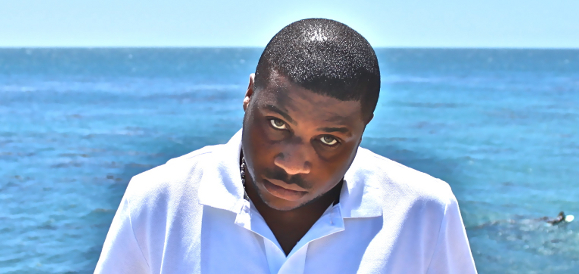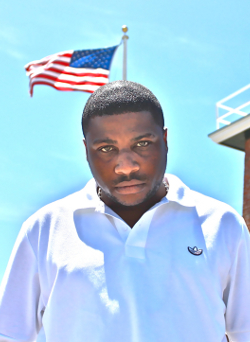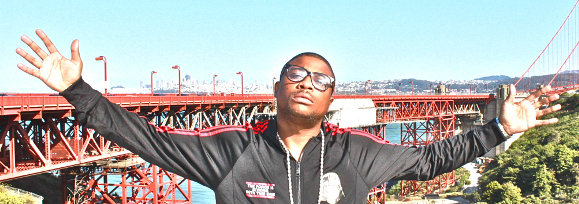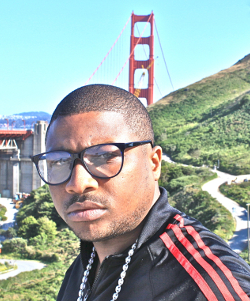Articles about reggae music, reviews, interviews, reports and more...
Interview: Gappy Ranks (2011)
- Home
- Articles
- Interviews
- Interview: Gappy Ranks (2011)

Interview: Gappy Ranks (2011)
"The real talent and the real stories will always overpower the fake ones"
Sampler
Since our last interview with Gappy Ranks he has continued on the path that took him out of poverty and homelessness to being the UK’s number one young reggae star. He’s released second album 'Thanks & Praise' - exploring the more modern dancehall and one-drop side to his repertoire. He’s played in Sheffield with David Rodigan, toured Japan during the earthquake (which he documented in song with I Was There), and performed bittersweet ballad Longtime (about the life he left behind) on the BBC’s flagship music programme Later With Jools Holland. But Gappy still lives in his local area and strongly believes that others can achieve what he did if they are prepared to follow their dreams. Angus Taylor spoke with the man and his manager Pierre Bost at Gappy’s North West London studio where he was voicing a Happy Birthday tune as catchy as the one sung around the world…

You’ve given the people vintage rhythms with the Peckings album. Now you’ve released your first one drop and dancehall album Thanks & Praise.
Put The Stereo On was a Studio 1 album talking about my childhood and the present day. The new album is exactly what it says, giving Thanks and Praise. I don’t believe an album should be songs just thrown onto a cd and compiled. It’s like cheating the listener. So my album and my songs tell a story and they’re all laid in a certain way and pattern. You’ll find Thanks & Praise produced by Jazzwad, One Day At A Time, dealing with my own personal relationships in a way everyone can relate to, songs like Tun Up featuring Russian, it’s new, it’s modern. You’ll also find Better Must Come which, if you’re in your down or worst times, it can only get better when it’s at its worst. Also Could A Run Away featuring Delly Ranx which is about how many times I’ve had to stand up and face the facts and what life threw at me. The people have a lot more important stuff to buy in the world – they need their toothpaste, toilet paper, got to pay rent, all these things - but if they have a little left over in these times of recession, buy the Gappy Ranks album because it’s a good buy and a good listen.
You’ve got quite an international cast of elements on the album – Russian and Delly from Jamaica, Macro Marco from Italy, Special Delivery from France…
Definitely because over the last two years Gappy Ranks has become international and my name is known internationally. Give Thanks for a great management team, Special Delivery, my own label Hot Coffee Music, labels like VP and Greensleeves, and friends and family. I have got to tour different parts of the world and understand myself and know myself. So therefore my music becomes international because you stop speaking about local and start speaking to the world. As you grow so does your music.
 Music was hard for me in school. I didn't care about Mozart
Music was hard for me in school. I didn't care about Mozart
Did you enjoy music at school?
Music was hard for me in school. In the UK curriculum when you learn music you learn classical music. Maybe I could have used that today but I was afraid to learn these things. I didn't understand them from the culture I was coming from. You have to remember this is a youth coming from a Harlesden, Jamaican background and you've got as teacher teaching you classical music. I didn't care about Mozart and - what’s his name? - Beethoven! I couldn't understand their music.  But the teacher understood who I was and I have to big up Mr Gilman. Also, IT - I hated going on the PCs with the black screen and the green writing. In my school we had ten Apple Macs and I refused to do the lesson unless I could use the Apple Mac. Up to this day I'm fond of Apple Mac so big up Mr O'Brien for keeping me on them!
But the teacher understood who I was and I have to big up Mr Gilman. Also, IT - I hated going on the PCs with the black screen and the green writing. In my school we had ten Apple Macs and I refused to do the lesson unless I could use the Apple Mac. Up to this day I'm fond of Apple Mac so big up Mr O'Brien for keeping me on them!
After you left school you went through some bad times. What happened?
I was going through unforseeken things like I had nowhere to live so I was all around the place but at the same time I was finding who I was. I went away for a whole year back to Dominica so that was finding myself. All these things made who Gappy Ranks is today and made me a stronger person. I’m still learning, still maturing and still searching. When I look back on my history I was a bad student. A bad child if you like. Growing up as an only son I found myself on the streets from a very young age. I wouldn’t like to say “mixing with the wrong crowd” because it was falling into the wrong problems. Problems at home. These things happen. But everything’s OK today.
Right now there’s a lot of discussion in the UK press about people getting into the music business through very privileged backgrounds via stage school and so on.
I’m not fussy because this is a crowded world and every day the population is rising so you’ll find in every different business and industry populations will rise. What I do know is music is something you cannot learn in a college or school. It’s within you. It’s a part of you. And what makes it part of you is the things you go through. A lot of music is emotional and heartfelt – the best musics are heartfelt and emotional. You find a lot of these songs are love songs or about hard life and so on. If you are in the music business and you’ve never lifted a finger in your life and you don’t know what it’s like in the real outside world, you’re going to find it hard after your one hit tune you paid so much to promote. But I don’t hate you for it because this is music and everyone’s entitled to do what they want. But the real talent and the real stories will always overpower the fake ones.
 If you’ve never lifted a finger in your life and you don’t know what it’s like in the real outside world, you’re going to find it hard after your one hit tune you paid so much to promote
If you’ve never lifted a finger in your life and you don’t know what it’s like in the real outside world, you’re going to find it hard after your one hit tune you paid so much to promote
You were on the BBC on Jools Holland. Did you watch Reggae Britannia? What did you think?
Honestly?
Yeah honestly.
It was a great show, great performance, great artists, but that’s not where reggae music ends. And for somebody watching and listening to reggae music for the very first time switching on BBC, they’d think that’s where all reggae music has started and stopped. They never dealt with the present and future of reggae music which is Gappy Ranks and many other artists. I’ve done so much for the UK that I should have been on that stage show. I felt it but I still watched and am giving joy so big up Dennis Bovell and all the rest who took part.
How did it feel to play with David Rodigan in Sheffield in April?
I remember listening to Rodigan on Kiss Fm from when I was a youngun. He was the first person I heard play Louie Culture Gangalee and Tiger's When and Tiger even bigs him up in the song. Just the other day Vybz Kartel bigged up David Rodigan, he's a very important person in the reggae business. Reggae music is something where when you love it you love it with a passion and he definitely has that passion just because of his knowledge, love and understanding of the music. It takes a lot of passion and love to do that. Rodigan is a very inspirational person.

People are always saying reggae is dying. Rodigan said last year that he wasn’t happy with what comes out of Jamaica, although he’s more impressed this year.
All respect to David Rodigan but what you have to remember is as music goes on you have so much passion for it that everybody feels hurt at how the industry be working. I myself think social networking has come in and declined artists from selling as much as they used to but it has also brought the world together and made it a lot easier for other artists – like I was – to be heard. Just like in everything you have problems and I’m sure as the industry comes together and gets its glory it will only get better. Big up people like Buju Banton (we all know the Buju Banton story and what Buju’s going through right now) but look at that – out of the worst times he’s going through right now he won a Grammy. In everything you have bad and good and you just have to take them as it goes.
 Reggae music is born from Jamaica. So all royalties are supposed to go to Jamaica anyway
Reggae music is born from Jamaica. So all royalties are supposed to go to Jamaica anyway
People also say reggae is doing much better outside JA than inside.
Well, what you have to remember is you are talking about a very poor country and has a lot of problems which the world needs to pay more attention to. And you have to remember reggae music is born from Jamaica. That’s where it comes from. So all royalties are supposed to go to Jamaica anyway. So yes, I do think Jamaica is missing out on a lot of the highlights they’re supposed to get but Jamaican people are everywhere and where they are so does their culture spread so that’s why there’s reggae music everywhere. It’s not about who’s embracing it more or who’s loving it more - it’s about the economy. And as I said before, if you have enough money to buy my album buy my album.  But people have got to wonder about how to put food on the table in places like Jamaica and things like that so big up every artist who’s working hard and doing their thing for reggae music – that’s all I can say.
But people have got to wonder about how to put food on the table in places like Jamaica and things like that so big up every artist who’s working hard and doing their thing for reggae music – that’s all I can say.
Do you think filesharing is as much of a problem as people say?
Definitely and a lot of the blame is with the record companies. Those were the ones who were supposed to be protecting the artists in the past, present and future time. They never locked onto the internet and the whole mp3 downloading – they were really late. So you had these sites coming and controlling it before the record companies. It’s their fault that we’re feeling the pain of the lack of policing our music and sales. But as I said it’s also beneficial, you have to see the positive out of everything, and things like this are helping my music be heard and played around the world. We have to live with it. Sorry.
How many rhythms would you say you voice in a year?
(laughter from others) About 1,500.
(Pierre: Nah, about 3-400)
No way! Last year I did about 700
(Pierre: No, 400 because when we’re on tour we don’t record)
Alright 500!
(Pierre: When you’re at home you record two a day but not on tour)
How many are released a year?
About 60.
What advice do you have for young people who want to make it in music?
Don’t be like me. Be like yourself. You are your best friend and your worst enemy. Respect yourself and others will respect you. See your dream and others will see it. Believe in yourself and others will believe. And for the young ones, brush your teeth in the morning.
(Pierre: And the evening!)
And in the evening.
Read more about this topic
Comments actually desactivated due to too much spams
Browse by categories
Recommended Articles
Latest articles
Recently addedView all
© 2007-2026 United Reggae. All Rights Reserved. Reproduction in whole or in part is prohibited. Read about copyright
Terms of use | About us | Contact us | Authors | Newsletter | A-Z














